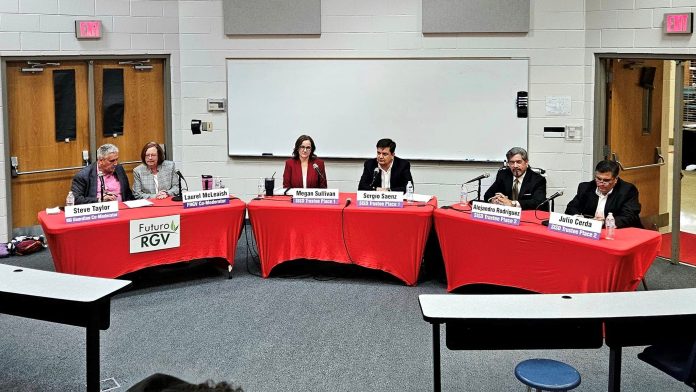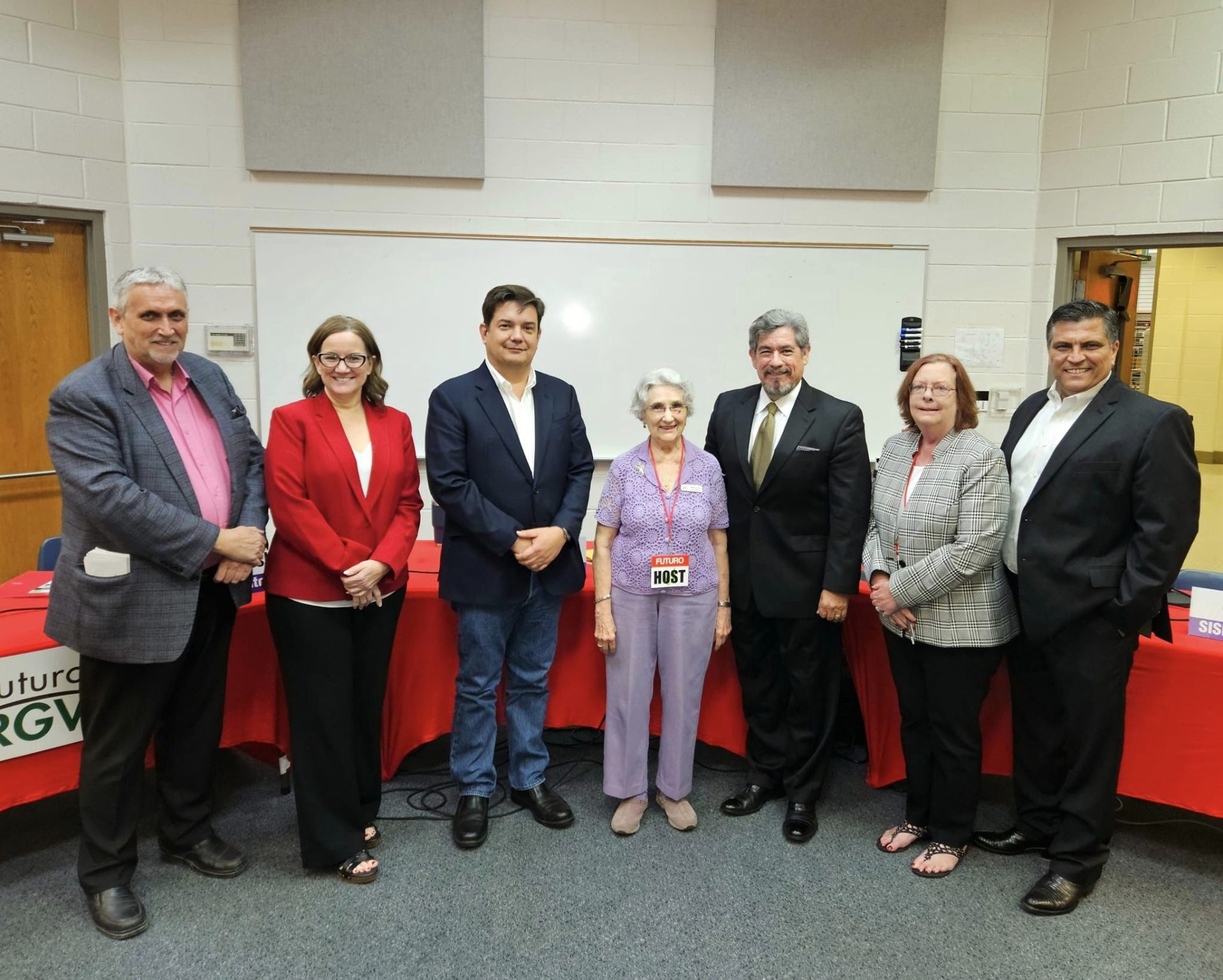
|
Only have a minute? Listen instead
Getting your Trinity Audio player ready...
|
Candidates for the two contested races in the upcoming Sharyland school board election met at a forum Tuesday that featured talk on safety, enrollment and the possibility of another bond push.
A race for an undefended seat features newcomers Sergio Saenz, a self-employed Mission resident, and Meagan Sullivan, a Mission educational diagnostician.
Meanwhile, incumbent Alejandro Rodriguez, a criminal investigator, is seeking to defend his seat against Julio Cerda, an engineer and former board trustee.
Talking about priorities for a prospective term on the board, candidates hit hard on safety and security.
Saenz said student and staff safety would be his priority if elected.
“If they are not safe, then everything else is unimportant,” he said. “If they don’t feel safe, if they don’t feel like they’re coming to a building that is safe and secure, then they’re not gonna want to come to school and they’re not gonna want to learn.”
Sullivan, on the other hand, said she feels the district faces an employee retention issue. Addressing that, she said, would lay the groundwork for other improvements at the district, including safety and security.
“We need to attract and retain and keep the highest quality, excellent teachers that we are known for having — teachers and administrators,” she said. “With that, everything kind of falls into place in a much more efficient and complete way.”
Rodriguez, the only incumbent at the forum, focused on detailing what the district has already done on the safety front, noting the erection of perimeter fences, guard shacks and armed guards.
“As a federal agent, and currently as a federal agent, I’m bestowed certain powers, certain authorities. I carry certain things with me that even right now, I think if we would have an active shooter situation, I think I could address it,” he said.
Cerda piggybacked off the safety issue and zeroed in on drugs, referencing a drug-related death in the community that he said indicates a problem that needs to be addressed.
“And we’re gonna make sure and follow up and make sure that we take care of whatever we need to do to make sure that we don’t allow fentanyl — and get more educated for the kids who are on fentanyl,” he said.
Talking about priorities for a prospective term on the board, candidates hit hard on safety and security.
The district is a stalwart holdout against going open enrollment. Students who live outside of Sharyland ISD’s borders have to pay if they want to attend school there.
Enrollment declines and associated decreases in funding spurred talks about going open enrollment in 2020, although those discussions ultimately did not bear fruit.
Open enrollment wasn’t popular with any of Tuesday’s candidates.
Cerda, Saenz and Sullivan all said they supported the district’s current enrollment policy and opposed going open enrollment.
“Sharyland is a place to cherish, and to be only used by us. And if others want to use it, they have to pay for the services that we provide — which is the best services throughout the Valley,” Cerda said.
Rodriguez had a slightly more nuanced view. He said the district is currently looking to grow its enrollment by 300 students, and said he’d be open to exploring some kind of selective merit-based open enrollment concept as a way to meet that goal.
“Why don’t we vet those kids — get those kids who are smart kids, get those kids who are going to be assets to our district, and get them here so we can have the numbers that we need,” Rodriguez said.
Open enrollment wasn’t popular with any of Tuesday’s candidates.
Candidates also talked about the possibility of another bond push.
In 2021, a $35 million bond package failed by just six votes.
Cerda was the most pro-bond of the candidates at the forum.
“John H. Shary Elementary and the bandhall and the rest of SHS needs the help. And we need to do it together, throughout the district. We need to make sure that the north and the south work together to make sure that we pass this bond issue to help out our kids,” he said.
Rodriguez, in contrast, seemed the least likely to warm to a prospective bond push. He said he wasn’t necessarily pro- or anti-bond, but certainly seemed to lean toward the latter camp and noted he was the sole trustee to vote against the bond election three years ago.
The pandemic and concerning economic trends that surrounded it, Rodriguez said, made the previous bond push a bad idea.
“I was thanked by administration that this bond did not go through, and let me tell you why. When we hit the COVID issue in this country and the prices of building material skyrocketed, we probably would have gotten only 50 cents to our dollar,” he said.

Candidates also talked about the possibility of another bond push.
Sullivan and Saenz were less eager to take a firm bond stance, Saenz appearing somewhat less likely to support a bond than Sullivan.
“I’ve seen the facilities,” he said. “They’re outdated. But we can explore other routes of getting funding. Try to get funding to lessen that fearful word, ‘bond.’”
Sullivan didn’t commit to being an immediate bond supporter if she’s elected, but she said she feels something has to be done for facilities. The last bond, she said, should have passed.
Sullivan attributed that bond’s failure as a mistake, one she said was caused by a lack of communication and community faith in the district.
“They questioned whether they could trust the administration with the funds to be used the way it was being said, that’s what everyone was saying,” Sullivan said of voters. “They were having trouble seeing what the need was. So we need to build the trust, have the bond, improve the buildings.”




